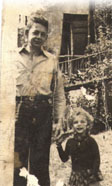Daddy’s Song of Saturday
By Linda Scott DeRosier
My daddy was born on a wooden table in the tiny kitchen of a house his daddy built up near the head of Bob’s Branch in Johnson County, Kentucky. Seventy-seven years later he died about five miles south of his birthplace in the master bedroom of a house he built for himself on Sant Preston Branch. In between he was a hell of a man, my daddy-a man tender enough to take delight in a nest of just-born kittens and tough enough never to miss a day’s work at the mines, however agonizing his sick headache might be. He lived in a time and a place where self-absorption was not an option and though he faithfully carried out his responsibilities, Daddy never took himself seriously. His legacy to me and Sister and to our children is one of effort and tenacity sustained by the inevitable laughter that comes off seeing the world as about a bead off plumb.
My daddy could build anything. Not only that, but he could also fix anything that was broken or had quit for any reason. He did most of what he termed his “Jake-leg” work on weekends or evenings in fall or spring when it was too late in the season for gathering or too early for grubbing. He’d come home from work afternoons around 4:30, wash the coal dust off him-Daddy never was one to use a bath house-eat a bite of supper, take his cup of coffee with him, and go off to construct or to repair. Sometimes the implement that was to be repaired or untangled was small enough so he could sit in a chair and pass the time with the rest of us while he worked at his leisure. Most times, however, he would work on the broken object just wherever it came to rest when it ran aground-inside the house, on the driveway, or in the backyard.
Since he drove-and hauled riders-twenty-some miles to and from the David coal mines five days a week, many of the repairs were car-oriented, and it seemed as if Daddy always had some kind of little car problem. Hollie Daniel, who lived about a half a mile up the creek from us, did the big car repairs, but Daddy didn’t take the car to Hollie until he had determined that it would require a part that could not be put on without some equipment we didn’t own.
One Saturday when I was about 9-years-old, my daddy taught me a lesson in perseverance that went unnoticed for just a lot of life. One of the Pack boys had broken his power saw, decided he probably needed a new one anyway, and traded the old one to Daddy for some combination of carpentry tools-and maybe a pocketknife or two. Daddy was always trading off one thing or another with other fellows on Two-Mile or around on Greasy; trading off provided a regular pastime for a lot of the men. On this particular Saturday morning, Daddy had carried that saw across the backyard from the can house, where he’d kept it for a week or so, backed up behind other more pressing jobs necessary to our day-to-day lives. Unlike essentials such as a broken refrigerator or a flat tire, scheduling the power saw repair had some give to it.


“Goddammit,” he said, when on his third attempt he couldn’t get a rise out of the thing. Just to be certain, he tried her one more time, then began-piece by piece-to break it down again. He was reassembling that saw as Sister went inside for a nap and Gwen and I shifted our attention from the apprehension of fractious crawdads to playing house over on the bank below the hog lot. This time Daddy tried only twice to get the saw going before silently beginning to take it apart.
Late that afternoon, as Gwen and I began to turn out our final set of dirt cakes, Daddy once more tried in vain to fire up his saw. As I passed him to go help Momma cook supper, he slowly shook his head and muttered to himself, “Now, I’m not to be outdone.”
Daddy’s project lay once again in pieces as I called him in to supper and I don’t recall his day’s work being mentioned at the table, but he was back at it before Momma got all the dishes transferred from table to dishpan. I don’t know what all my daddy did to that saw or even how many times he fooled with it, but he was putting it together again an hour or so later as I folded my dish towel and hung it to dry on the side of the drain board.
Around 10 that night, I was getting into my pajamas when I caught the first low whine from Daddy’s all-Saturday project, but it was not by any means the last time I heard its keening. I don’t believe he got another saw until well after our house burned five or six years later. While the fire took everything else we had, that old saw survived by being in the trunk of Momma’s car, and Daddy used it to rebuild the new house.
Daddy & Johnny K
Daddy always said that being smart was secondary to the willingness to work at something until you figured it out. Daddy also did not believe a really smart person would ever show out, for to do so would be to put folks on notice that they had to watch out for you, making it less likely that you’d ever get what you were after. In Daddy’s view, a worker could always get ahead by not worrying about what the other fellow was doing and just privately going about minding his own business and doing his own job. He really looked down on folks who thought they were somebody and couldn’t keep from telling you about it.
Daddy had a cousin, Johnny K, who had gone away to Michigan to work the steel mills, married well, and made good in his father-in-law’s construction business. He’d come driving his big old Chrysler home of a summer, stay for two or three days, and buy his mother a new refrigerator or bottled gas stove before he headed back north. He was maybe 10 years older than Daddy, but they’d both grown up over on the head of Bob’s Branch, so he always made sure to come by and see us when he was home. Johnny K had two or three kids, though we never saw them; we never saw hide nor hair of his wife either. We understood that Johnny K did bring his wife home one time right after the war, because Pop Pop remembered having seen her. He said she was a spindly little thing-quiet-not at all like big old, backslapping Johnny K.
Daddy was never one to talk about money-never said we had it, never said we didn’t-but Momma would tell me from time to time when the family financial fortunes were particularly bad or good. One spring, when I was about 13-years-old, Momma confided that Daddy’d been able to get a lot of overtime the year before and had made nearly five thousand dollars. In the early ’50s, that must have been considerably more money than folks in our community made-Momma always knew such things. She was clearly proud of that figure-wouldn’t have bothered to tell me otherwise-and it sounded like about all the money in the world to me. I kept it to myself, of course, and I might well have forgotten all about it had it not been for the Johnny K incident.
A few months after Momma had imparted this wage information to me, I walked back across the road from an early evening water-fetching trip to find Johnny K sitting in the yard with Daddy. As I stood at the well box, drawing the second bucket of water, I had seen him pull in on the driveway and had barely edged my two-bucket load past his big black Chrysler, barely pulled off the road. Johnny K never would pull his car all the way into our driveway-out of concern, he said, for whether “that little bridge will hold it.” He made a point of saying that every time he came to see us, and nobody ever pointed out that the boy who brought our winter’s coal routinely drove his fully loaded half-ton pickup across that “little bridge” without incident.
By the time I got my cargo in the house, poured me a glass of tea, and joined Daddy, Momma, Betty Holbrook, and Johnny K in the yard, our guest from the north was into a full-tilt bragging fest. The four of them were sitting in those heavy, arch-backed, aluminum lawn chairs-the ones with the ninety-degree bent-back pipe supports-that Daddy had painted pink, and Sister was piddling around over on the rope swing about fifteen feet away. I spread out the old yellow towel I’d brought from inside there on the ground and plopped down on it. As I took the first sip of Momma’s supersweet tea, cooled by the lone cube of ice (ice was not easy to come by in that long-ago Kentucky summer, so we rationed it very carefully), Johnny K launched into a new story.
He began, “You know, Lifie Jay, I give Uncle Sam more than five thousand dollars in income taxes this year,” and he paused to allow this bit of information to sink in. Without missing a beat, Daddy slowly shook his head, said, “Aye, boys. Don’t reckon you could loan a feller a couple bucks, could you?”
We all laughed and Johnny K continued with his tale.
Linda Scott DeRosier is the author of Creeker: A Woman’s Journey. ‘Daddy’s Song of Saturday’ and “Daddy and Johnny K” are excerpted from her forthcoming book, Songs of Life and Grace coming in August 2003 from University Press of Kentucky.
[amazon asin=081319024X&template=iframe image][amazon asin=0813191971&template=iframe image]







